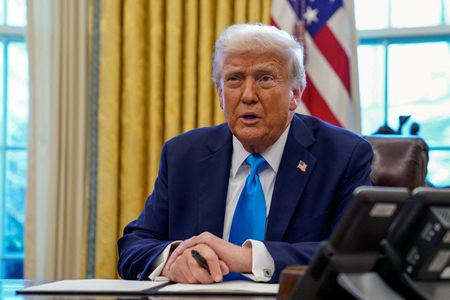By Bhanvi Satija and Patrick Wingrove
(Reuters) -Eli Lilly on Thursday suggested that demand for its popular diabetes and weight-loss treatments was not a concern, easing investor agitation about signs of weakness in sales of the drugs.
Lilly said on a call with analysts that it still believed there was huge demand for its weight-loss drug Zepbound and diabetes treatment Mounjaro from hundreds of millions of patients.
The drugmaker’s shares were up nearly 5% at $882 in afternoon trading. The stock has more than doubled in value in the last two years, making it the most valuable healthcare company in the world, but has been subdued since October when Lilly reported disappointing sales for its highly in-demand treatments.
The Indianapolis-based drugmaker reported sales for its Zepbound and Mounjaro of $1.91 billion and $3.53 billion respectively, in line with its forecast from last month that fell below analysts’ expectations for the second straight quarter and raised questions about demand.
Analysts as of Thursday were expecting $2.03 billion for Zepbound and $4.27 billion for Mounjaro, according to LSEG data. Lilly has previously attributed the miss to issues in the supply chain.
Lilly also said on the call that it was already building manufacturing capacity for its experimental oral obesity drug, orforglipron, which eased some analyst concerns over the medicine’s success.
“Short of guaranteeing success, which they can’t do because they haven’t seen a lot of the data, it’s about as confident tone as you can expect from or as you’d want from a management team,” said Kevin Gade, chief operating officer at Bahl & Gaynor, which owns Lilly’s shares.
Eli Lilly also forecast annual profit largely above Wall Street estimates on Thursday, saying it expects to earn between $22.50 and $24.00 per share on an adjusted basis this year. Analysts were expecting a profit of $22.86 per share, according to data compiled by LSEG.
The results “put things back on track for Lilly after a rocky period,” said Yuri Khodjamirian, chief investment officer at ETF-operator Tema ETF. Tema’s Cardiovascular & Metabolic ETF tracks Lilly and rival Novo Nordisk’s.
“It’s quite clear that the company is hopefully back on track in terms of its growth and outlook,” he said.
Investors had said they were keen to hear Lilly’s plans for international growth and how it can effectively learn from the lessons of 2024, to plan ahead for this year.
Lilly’s Zepbound and Novo’s Wegovy dominate a market for weight-loss treatments that analysts estimate could be a $150 billion market by the early 2030s. Both the drugmakers have seen rapid growth in recent years, fueled by investor interest in these drugs.
Novo on Wednesday forecast slower growth this year compared to 2024, and said it saw “intact strong demand for obesity treatments” in the United States and elsewhere.
Lilly last month forecast total sales to be between $58 billion and $61 billion in 2025, banking on the launch of Mounjaro in new markets, including China, India, Brazil and Mexico, for both diabetes and obesity. Analysts on average estimate revenues of $59.21 billion for 2025, according to LSEG data.
The company said it expects U.S. growth of its diabetes and weight-loss drugs to be consistent with 2024.
Lilly and Novo have spent billions to ramp up manufacturing of their treatments as well as in research and development.
“They need to be spending this money to deliver growth,” Khodjamirian said.
(Reporting by Bhanvi Satija and Mariam Sunny in Bengaluru and Patrick Wingrove in New York; Editing by Sriraj Kalluvila, Mark Porter and Nick Zieminski)











